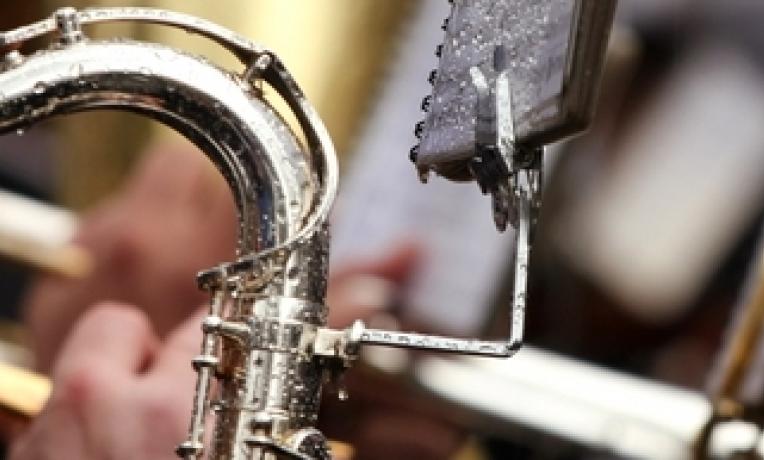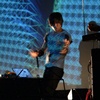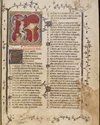Music day 2012: a "best of" ERC projects

How bodily gestures can make music
 Music is magic in the sense that it can take time to master but the results are amazing: people can dance to it, tap their feet or nod their head. Prof Atau Tanaka, a well-known composer and performer of music, proposes to address the extent to which digital technology has developed new interfaces for the active production and consumption of music. Prof Tanaka wants to create gestural, interactive musical instruments for musicians and non-musicians alike: he wishes to involve the whole body, the space and the situation around it to create what he calls an "embodied musical interaction". He proposes to design new musical instruments that use advanced sensor technologies, such as bio-signal sensors detecting muscle tension of the arms and other limbs, accelerometers on I-phones and the Global Positioning System (GPS) embedded in mobile devices to track movements and population dynamics. He is also of the opinion that there is a need to reframe the way musical creation and consumption are viewed; to do so, he proposes a User Centered Design methodology where engineers and designers can work together to create creative media systems targeted for music lovers. The intriguing instruments that he has already showcased - such as a device that uses muscle tension in the form of electromyogram (EMG) signals to control synthesisers and perform electronic music – will be tested in real situations and concerts and new prototypes will be designed. Referring to the concept of "musicking", he expects his project will shed new light on the acts of engagement with music by both virtuosos and non-musicians.
Music is magic in the sense that it can take time to master but the results are amazing: people can dance to it, tap their feet or nod their head. Prof Atau Tanaka, a well-known composer and performer of music, proposes to address the extent to which digital technology has developed new interfaces for the active production and consumption of music. Prof Tanaka wants to create gestural, interactive musical instruments for musicians and non-musicians alike: he wishes to involve the whole body, the space and the situation around it to create what he calls an "embodied musical interaction". He proposes to design new musical instruments that use advanced sensor technologies, such as bio-signal sensors detecting muscle tension of the arms and other limbs, accelerometers on I-phones and the Global Positioning System (GPS) embedded in mobile devices to track movements and population dynamics. He is also of the opinion that there is a need to reframe the way musical creation and consumption are viewed; to do so, he proposes a User Centered Design methodology where engineers and designers can work together to create creative media systems targeted for music lovers. The intriguing instruments that he has already showcased - such as a device that uses muscle tension in the form of electromyogram (EMG) signals to control synthesisers and perform electronic music – will be tested in real situations and concerts and new prototypes will be designed. Referring to the concept of "musicking", he expects his project will shed new light on the acts of engagement with music by both virtuosos and non-musicians.Picture ©Atau Tanaka
Grantee: Prof Atau Tanaka
Host institution: Goldsmith's College London (UK)
ERC project: Meta-Gesture Music: Social, Embodied, Interactive Musical Instruments (METAGESTUREMUSIC)
ERC call: Starting Grant 2011
ERC funding: € 1.6 million for five years
Links
http://www.ataut.net/
http://www.gold.ac.uk/computing/staff/academic/tanakaatau/
Reviving eastern Indian Ocean history through music
 Music is a rich focus for historical research; not only it is emotionally powerful but it is also used widely across many domains of social and political activity. Headed by Katherine Butler Schofield, this project investigates how and why transitions from pre-colonial to colonial musical fields occurred in the Eastern Indian Ocean region during the period of British expansion, c. 1750-1900. By combining history and ethnomusicology, the research team argues that although music underwent large-scale changes during colonialism, pre-colonial systems were gradually transformed and there was no radical disjuncture. In other words, colonial infrastructures in the eastern Indian Ocean did not wholly displace the long-standing networks that preceded them: they even facilitated new exchanges between local players and the colonising powers. The project will seek to study India and the Malay world as a single connected region, rather than separate cultural arenas, for the purposes of music history. The ambitions of this project are two-fold: (i) to show the continuities and mutual appropriations of pre-colonial and colonial musicians and how they interacted to create modern musical fields and (ii) to provide new insights into the relationship between European and indigenous systems in the transition to colonialism through the lens of ethnomusicology.
Music is a rich focus for historical research; not only it is emotionally powerful but it is also used widely across many domains of social and political activity. Headed by Katherine Butler Schofield, this project investigates how and why transitions from pre-colonial to colonial musical fields occurred in the Eastern Indian Ocean region during the period of British expansion, c. 1750-1900. By combining history and ethnomusicology, the research team argues that although music underwent large-scale changes during colonialism, pre-colonial systems were gradually transformed and there was no radical disjuncture. In other words, colonial infrastructures in the eastern Indian Ocean did not wholly displace the long-standing networks that preceded them: they even facilitated new exchanges between local players and the colonising powers. The project will seek to study India and the Malay world as a single connected region, rather than separate cultural arenas, for the purposes of music history. The ambitions of this project are two-fold: (i) to show the continuities and mutual appropriations of pre-colonial and colonial musicians and how they interacted to create modern musical fields and (ii) to provide new insights into the relationship between European and indigenous systems in the transition to colonialism through the lens of ethnomusicology.Picture ©Jim Sykes
Grantee: Dr Katherine Butler Schofield
Host institution: King's College London (UK)
ERC project: Musical Transitions to European Colonialism in the eastern Indian Ocean (MUSTECIO)
ERC call: Starting Grant 2010
ERC funding: € 1.2 million for four years
Links
http://kcl.academia.edu/KatherineButlerSchofield
http://musicaltransitions.wordpress.com/
Comparative studies of the transformation of music by digital media and digitisation
 Music is rapidly being transformed by digital technologies. With the growth of internet access and the expanding use of mobile music consumption devices and new media platforms, as well as dedicated music production technologies like the digital audio workstation, novel musical practices are emerging. The modes of creation, consumption and circulation of music have changed, leading to "digital musical cultures", although the forms they take can be radically different in the developed and developing worlds. Downloading, peer-to-peer file sharing, social networking and sound-sharing sites are just a few examples of the changes. Georgina Born, who is leading this project, is directing a series of in-depth ethnographic studies by researchers in six countries: the UK, Canada, Kenya, India, Argentina and Cuba. Each study adopts a distinctive focus sensitive to local conditions and cultural history; crossing them are a number of comparative research themes, among them transformations in the nature of musical performance, new digital and musical literacies, novel aesthetic forms, the rise of digital archiving of folk musics, digital music’s new social and organisational forms, and intensifying forms of collaborative musical authorship which raise questions for copyright law. By integrating the empirical research with current ideas from social, anthropological and media theory, the project intends to establish a new field of comparative studies of digital music cultures.
Music is rapidly being transformed by digital technologies. With the growth of internet access and the expanding use of mobile music consumption devices and new media platforms, as well as dedicated music production technologies like the digital audio workstation, novel musical practices are emerging. The modes of creation, consumption and circulation of music have changed, leading to "digital musical cultures", although the forms they take can be radically different in the developed and developing worlds. Downloading, peer-to-peer file sharing, social networking and sound-sharing sites are just a few examples of the changes. Georgina Born, who is leading this project, is directing a series of in-depth ethnographic studies by researchers in six countries: the UK, Canada, Kenya, India, Argentina and Cuba. Each study adopts a distinctive focus sensitive to local conditions and cultural history; crossing them are a number of comparative research themes, among them transformations in the nature of musical performance, new digital and musical literacies, novel aesthetic forms, the rise of digital archiving of folk musics, digital music’s new social and organisational forms, and intensifying forms of collaborative musical authorship which raise questions for copyright law. By integrating the empirical research with current ideas from social, anthropological and media theory, the project intends to establish a new field of comparative studies of digital music cultures.
Grantee: Prof Georgina Born
Host institution: University of Cambridge (UK)
ERC project: Music, Digitization, Mediation: Towards Interdisciplinary Music Studies (MusDig)
ERC call: Advanced Grant 2009
ERC funding: € 1.7 million for five years
Links
http://www.music.ox.ac.uk/research/musdig.html
http://www.sociology.cam.ac.uk/contacts/staff/profiles/gborn.html
http://www.music.ox.ac.uk/news/recent-articles/georgina-born-appointed-professor-of-music-and-anthropology.html
The quest for a new generation of sounds
 The revolutionary changes that have been made in computer simulation and physical modelling now allow engineers, acousticians and musicians to open new avenues of experimentation. This project, led by Stefan Bilbao, is meant to create very high-quality synthetic sounds and to explore new classes of sounds which cannot be produced with conventional synthesis methods or acoustic instruments. This research is at the crossroads between music, numerical analysis and computing: the expectation is that it will generate sounds which possess all the richness of acoustically-produced sounds. By expanding the quality of virtual synthetic sound, and relying on large-scale computer simulations of musical instruments, it will study targeted systems such as brass instruments, and percussion based on plate and shell vibration, electromechanical instruments, and simulate those effects in 3D acoustic spaces. The ambition is to pave the way for introducing new modelling methods into the worlds of electronic music and virtual environments. Experimental testing, prototyping with established composers of electronic music and performances will also be proposed throughout the project.
The revolutionary changes that have been made in computer simulation and physical modelling now allow engineers, acousticians and musicians to open new avenues of experimentation. This project, led by Stefan Bilbao, is meant to create very high-quality synthetic sounds and to explore new classes of sounds which cannot be produced with conventional synthesis methods or acoustic instruments. This research is at the crossroads between music, numerical analysis and computing: the expectation is that it will generate sounds which possess all the richness of acoustically-produced sounds. By expanding the quality of virtual synthetic sound, and relying on large-scale computer simulations of musical instruments, it will study targeted systems such as brass instruments, and percussion based on plate and shell vibration, electromechanical instruments, and simulate those effects in 3D acoustic spaces. The ambition is to pave the way for introducing new modelling methods into the worlds of electronic music and virtual environments. Experimental testing, prototyping with established composers of electronic music and performances will also be proposed throughout the project.
Grantee: Stefan Bilbao
Host institution: University of Edinburgh (UK)
ERC project: Listening to the Future: Next Generation Sound Synthesis through Simulation (NeSS)
ERC call: Starting Grant 2011
ERC funding: € 1.4 million for five years
Links
http://www2.ph.ed.ac.uk/~sbilbao/
A plunge into the troubadour poetry of the 14th and 15th centuries
 The poetic universe of the classic troubadours has been thoroughly explored by scholars. However, little is known about the Catalan lyrical literature of the 14th and 15th centuries. By studying the style, the genre and the language of Catalan poetry, Anna Alberni aims to highlight the work of Occitan and Catalan poets and several anonymous artists whose pieces have been preserved in various anthological chansonniers. She believes such a medieval heritage is an important cultural bridge to improve our understanding of the transition from the classical troubadour tradition to later cultural developments under the Catalan and the Spanish Renaissance. A specialist in medieval romance poetry and "courtly love", she will structure her project around three main lines of research: (i) the creation of a digital critical edition of the troubadour poetry popular in the Crown of Aragon between the 14th and 15th centuries (ii) an analysis of the grammatical and poetical treatises written by Catalan medieval scholars (iii) an interpretation of the influence of French and Occitan poetry on late medieval Catalan lyrical texts. By using music, linguistics, literature and history, her team expects to understand why the troubadour canon and repository have marked history and haunted for so long the musical and literary productions of Europe.
The poetic universe of the classic troubadours has been thoroughly explored by scholars. However, little is known about the Catalan lyrical literature of the 14th and 15th centuries. By studying the style, the genre and the language of Catalan poetry, Anna Alberni aims to highlight the work of Occitan and Catalan poets and several anonymous artists whose pieces have been preserved in various anthological chansonniers. She believes such a medieval heritage is an important cultural bridge to improve our understanding of the transition from the classical troubadour tradition to later cultural developments under the Catalan and the Spanish Renaissance. A specialist in medieval romance poetry and "courtly love", she will structure her project around three main lines of research: (i) the creation of a digital critical edition of the troubadour poetry popular in the Crown of Aragon between the 14th and 15th centuries (ii) an analysis of the grammatical and poetical treatises written by Catalan medieval scholars (iii) an interpretation of the influence of French and Occitan poetry on late medieval Catalan lyrical texts. By using music, linguistics, literature and history, her team expects to understand why the troubadour canon and repository have marked history and haunted for so long the musical and literary productions of Europe.Picture ©The James E. and Elizabeth J. Ferrell Collection and The Master and Fellows of Corpus Christi College, Cambridge Library
Grantee: Anna Alberni
Host institution: University of Barcelona (Spain)
ERC project: The Last Song of the Troubadours: Linguistic Codification and Construction of a Literary Canon in the Crown of Aragon (The Last Song)
ERC call: Starting Grant 2009
ERC funding: € 436.000 for three years
Links
http://www.icrea.cat/Web/ScientificStaff/Anna-Alberni-Jorda-364
http://www.ircvm.net/Organigrama9698/Investigadors9698/InvestigadorsTitulars/Fitxes/AnnaAlberni/tabid/123/language/ca-ES/Default.aspx

